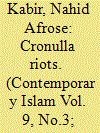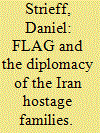| Srl | Item |
| 1 |
ID:
145041


|
|
|
|
|
| Summary/Abstract |
On 11 December 2005 at Sydney’s Cronulla Beach about 5000 Australians, mostly young men from Sutherland Shire, wrapped themselves in Australian flags and asserted that Cronulla Beach belonged to them through abusive language against Lebanese Australians. Subsequently, on 12 December 2005 a group of Australians of Lebanese heritage launched an attack in reprisal. The former group exhibited their “Australianness” through an urban model based on exclusion, implying they were the West so, of course, they were better than the rest. The latter fought back, exhibiting that they also represented the West. They demonstrated their territorial rights as they asserted that the beach also belonged to them. The rather aggressive posturing of both parties raises the question of whether Muslim Australians have a place in the white imaginary spatiality.
|
|
|
|
|
|
|
|
|
|
|
|
|
|
|
|
| 2 |
ID:
157217


|
|
|
|
|
| Summary/Abstract |
The extraordinary public diplomacy carried out by the families of the American hostages held in Iran from 1979 -1981 domesticated and humanised the biggest foreign policy crisis of Jimmy Carter's presidency. The families, notably represented by the Family Liaison Action Group (FLAG), led an unprecedented campaign to raise awareness of the plight of their relatives. The families designed their efforts to garner public and media attention, and manage relations with the press. To that end, the news media emerge as a singularly influential domestic actor in this episode. Moreover, women constituted the vast majority of family members regularly cited in news coverage and occupied a sizeable leadership role within organised activities during the crisis. The centrality of the families helped harden American attitudes toward Iran: not merely an outgrowth of a diplomatic dispute, it represented a sort of personal violence toward individual Americans and their families.
|
|
|
|
|
|
|
|
|
|
|
|
|
|
|
|
| 3 |
ID:
177714


|
|
|
|
|
| Summary/Abstract |
This article explores contemporary artistic practices in Kazakhstan that challenge narratives on national belonging and identity through the notion of queerness. It discusses artworks created by artists Saule Dyussenbina, Natalya Dyu and Kuanish Bazargaliyev, the artistic duo Kreolex Center, and the advertising agency Havas Worldwide Kazakhstan, which were created as a reaction to global discussions around gender and sexuality happening in and between various countries. It seeks to scrutinize different approaches and aspects presented in each artwork and argues that the overall strategy present in all the artistic testimonies is humour. While drawing on key concepts and categorizations of humour that permit the uncovering of the ways in which humour creates specific knowledge and identity, this article looks at humour techniques more broadly and builds on the argumentation provided by Uroš Čvoro and Chrisoula Lionis that opt for humour analysis connected to temporality and its perception in the works of art.
|
|
|
|
|
|
|
|
|
|
|
|
|
|
|
|